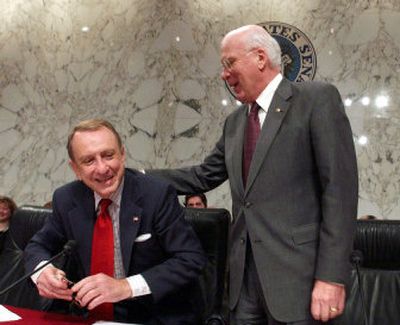Little learned from Alito hearings

WASHINGTON – In three days of testimony before the Senate Judiciary Committee, Judge Samuel Alito explained both everything and nothing about his judicial philosophy, depending on whom you ask.
Alito, whom President Bush has nominated to replace Justice Sandra Day O’Connor on the Supreme Court, revealed himself to be either a restrained, open-minded jurist with no agenda or a partisan ideologue who would yank the court sharply rightward – again, depending on whom you ask.
As the hearings concluded Friday with Alito headed for near-certain confirmation, it became clear that the 18 hours of back-and-forth between senators and the nominee failed to offer much insight into Alito’s decision-making process or beliefs.
Instead, it merely produced enough generalities to draw just about any conclusion about what kind of justice Alito would be on the high court.
The hearings left many on both sides of the aisle wondering about the value of this part of the judicial confirmation process, with Sen. Joseph Biden, D-Del., openly suggesting the hearings should be abandoned.
“I’ve reached a conclusion, after all these years, that we probably shouldn’t even have these hearings,” Biden said on Thursday. “We should just go to the floor of the United States Senate, debate the relative merits of the positions of the nominee, and vote.”
Sen. Arlen Specter, R-Pa., the chairman of the committee, said that even in a hearing as lengthy as Alito’s, there would always be a need for more time to probe the nominee.
“Some senators asked the repetitive questions again and again and again and did not really make effective use of the time,” he said. “But that’s an individual senator’s choice. Nobody can tell a senator what questions to ask.”
Alito picked up Specter’s endorsement on Friday, a huge step toward confirmation. Specter is one of the Senate’s leading proponents of abortion rights and has indicated he wouldn’t vote for a nominee who would help overturn Roe v. Wade, the 1973 ruling that legalized abortion.
Democrats on Friday moved to delay Tuesday’s scheduled committee vote on Alito by at least two days or as much as a week. Specter resisted the delay, but said he would negotiate with the committee’s ranking Democrat, Sen. Patrick Leahy of Vermont, over the weekend.
A delay would give anti-Alito groups more time to lobby for his defeat and to air commercials against him in states with fence-sitting senators. But the best that Democrats appear to be able to do now is make his vote the closest since Clarence Thomas’ 52-48 confirmation to the Supreme Court in 1991.
Three other pro-abortion rights Republicans – Sens. Olympia Snowe and Susan Collins of Maine and Lincoln Chafee of Rhode Island – said they saw no reason to block a vote on Alito through a filibuster. That procedural tactic requires 60 votes to end debate and bring a nomination to a vote.
“I don’t think there is any life in it as a political issue,” Specter said about abortion, which at times dominated the hearings.
But Democrats, who will meet Wednesday to decide on a course of action, could still maneuver to make a political statement. If Alito gets fewer than 60 votes, it would send a signal to the White House that any future nominee like Alito could face a filibuster.
Alito’s performance before the committee wasn’t unlike those of every nominee since Robert Bork, whose candidly conservative assertions fueled his rejection in 1987 and set the stage for hearings that are more game-like than probative.
Alito wasn’t evasive and largely avoided flat refusals to answer questions. He also adroitly disarmed Democratic interrogations by responding with intensely technical answers about case law and a constant refrain that he decides all cases with an “open mind” and according to the facts.
But his answers also committed him to nothing beyond general platitudes that nearly all judges accept.